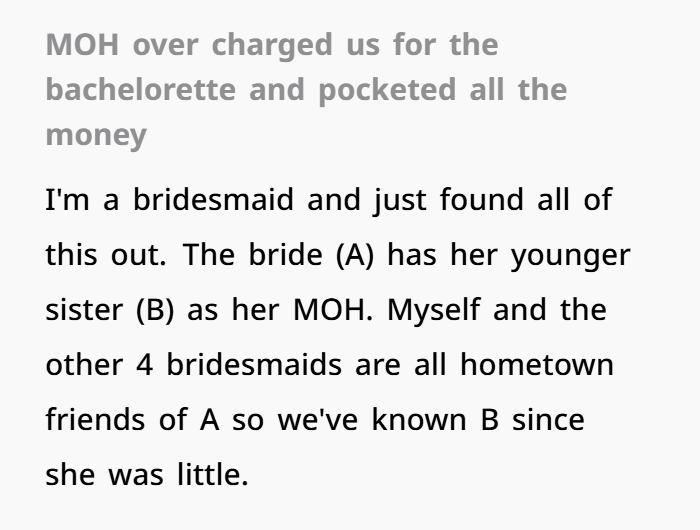MOH Overcharged Bridesmaids, Pocketed Nearly $3K—Wedding Week Fallout

At a local bachelorette weekend organized by the Maid of Honor (MOH, the bride’s younger sister), bridesmaids contributed to an Airbnb, food, drinks, and decorations. After the trip, the MOH sent a group Venmo request for unexpectedly high amounts, claiming the costs were split evenly. The bride’s cousin later revealed the MOH had charged her mom’s card and secretly pocketed nearly $3,000—including an extra $50 per bridesmaid—justifying it by being “broke” and needing to repay a friend from Coachella. The revelation has angered the bridal party, who now face a dilemma: expose the betrayal to the bride or preserve wedding day harmony.
Advertisement – Continue Reading Below
Being scammed is one of the worst feelings anyone could ever experience

This was what a bridesmaid went through involving the maid of honor, whom she had known for a long time


















1. Financial Ethics in the Bridal Party
Asking bridesmaids to evenly split pre-wedding event costs is common, but transparency is critical. According to The Knot’s guide on bridesmaid expenses, participants are typically expected to pay for their own attire, travel, and bachelorette party activities—but not for inflated expenses or hidden markups weddingwire.com+9theknot.com+9reddit.com+9. Financial ambiguity—like an end-of-event Venmo request without itemization—should prompt clear communication or a written breakdown before payment.
2. The Psychology of Betrayal
Beyond financial misconduct, the MOH’s actions may constitute emotional betrayal. As the bride’s sister, she held a position of trust—and her deceit undermines both personal and familial bonds. Studies on betrayal in close relationships highlight how misuse of trust can have deeper emotional effects than monetary loss, creating long-term relationship fractures.
Advertisement – Continue Reading Below
3. Confronting the Greed: What Other Bridesmaid Stories Reveal
The Public discourse is full of MOH spending drama. A wedding party member on People shared frustration when bridesmaids were charged extra after a sleepless planning process . Another bride demoted her MOH over a disputed dress cost ($350 versus $150), triggering intense discussion on financial expectations within bridal teams people.com+10brides.com+10people.com+10. These parallels underscore how easily pre-wedding finances veer into entitlement and resentment.
4. Legal Exposure and Financial Remedies
While unlikely to reach the courts, the MOH’s actions could be financially actionable under fraud or unjust enrichment principles. A broad consensus in small claims litigation suggests that falsifying expense claims and deliberately profiting at others’ expense could constitute financial harm. At minimum, an official demand letter requesting restitution might mobilize repayment more effectively than confrontation.
5. Options for Confrontation or Resolution
With the wedding looming, bridesmaids face four main paths:
Advertisement – Continue Reading Below
- Immediate restitution request: Confront the MOH directly with evidence and demand repayment.
- Involve the bride: Share the facts with the bride, risking her shock and family tension.
- Coordinate a collective demand via MOH’s mom: This happened—bridesmaids were refunded the $50 upcharge, though the bulk remains unreturned.
- Let it go quietly: Preserve the bride’s happiness but accept unresolved betrayal.
Each choice involves tradeoffs between financial justice, relationships, and wedding-day peace.

6. Social Media Amplification
The original Reddit post went viral on r/weddingshaming, prompting wide commentary people.com+8theknot.com+8people.com+8reddit.com+1people.com+1. Social media in wedding contexts often serves as both amplifier and judge, influencing real-world behavior. Public scrutiny may pressure the MOH or her family to make full restitution—especially if reputational concerns outweigh financial cost.
7. Ethical vs. Legal Responsibility
Morally, the MOH violated core groom-bride-sister ethics. She abused her role and the women’s goodwill. Legally, she may be liable for fraud or conversion, given she knowingly requested funds for expenses that were charged to her mom and not incurred. The partial restitution of the $50 overcharge reflects acknowledgment of wrongdoing—but falls far short of full accountability.
Advertisement – Continue Reading Below
8. Restoring Trust: Rebuilding or Walking Away
Two potential long-term paths:
- Family mediation: A third-party facilitator could help the bride, MOH, and bridesmaids navigate restitution, apologies, and prevention of future trust issues.
- Estrangement: If the bride chooses forgiveness for her sister’s sake, wounds may linger—eroding true closeness even if the wedding day remains conflict-free.
Recommended Actions
- Bridesmaids should compile precise records of their payments and estimated actual costs.
- A formal, group request to the MOH (backed by documentation) could increase pressure for full repayment.
- If the bride remains unaware, consider a gentle, fact-based disclosure—emphasizing concern for her trust and wedding peace.
- Whether through direct confrontation, legal action (e.g. small claims), or mediated resolution, ensure honesty, transparency, and collective support.
Most readers unanimously called for exposing the scam, with some suggesting getting the authorities involved











